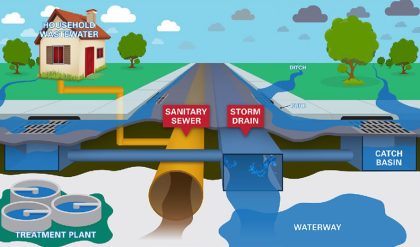
A look at the three major types of plumbing systems in order to gain a better understanding of the field of plumbing as a whole.
An Overview of Plumbing Systems
The plumbing in any building serves two main purposes. The first is to bring water into the structure for human use, and the second is to remove wastewater of various types. There are three main types of plumbing systems: potable water, sanitary drainage and stormwater drainage. A good commercial plumber in Las Vegas knows how to do plumbing work within these three systems according to local building codes.
Potable Water System
The potable water system brings water into a structure; this water comes from the community water main. There is a valve on the water main itself for each structure that can be used to shut off its water supply. From there, a single pipe brings water into the structure, and it is then distributed to individual fixtures through a network of pipes. A meter keeps track of how much total water enters the structure.
Sanitary Drainage System
The sanitary drainage system removes wastewater from a building. It consists of pipes that take out human waste and fecal matter as well as wastewater from cooking, laundry, etc. The sanitary drainage system is connected to a series of vent pipes that go through the roof vertically; this allows for the venting of gases and for the entire system to operate at atmospheric pressure. The sanitary drainage system ultimately takes wastewater to the community sewer system.
Stormwater Drainage System
The purpose of the stormwater drainage system is to carry rainwater away from a structure. In older structures, rainwater simply drains into the sanitary drainage system, but in buildings that are more modern a separate system of drains carries water into the community storm sewers. Gutters are a part of the stormwater drainage system visible from outside the structure; other components, such as drains and pipes, are below the ground.


